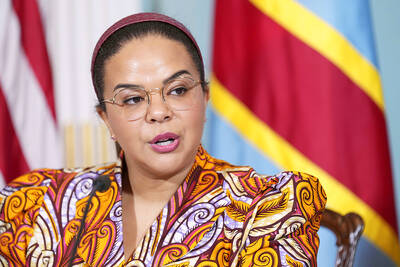Australia’s chief climate adviser yesterday urged a 10 percent reduction in greenhouse gas emissions by 2020 but conceded this may not save the country’s natural assets such as the Great Barrier Reef.
In an assessment of the targets required to manage the harmful effects of air pollution on climate, Ross Garnaut said Australia should cut its emissions by 10 percent of 2000 levels by 2020 and by 80 percent by 2050.
This would be Australia’s share of the burden if international agreement was reached to limit carbon emissions in the atmosphere to a concentration of no more than 550 parts per million molecules, Garnaut said.
He said while a global objective of 450 parts per million would suit Australia better, his review’s targets and trajectories “are the best available to us now” as emissions rise rapidly because of global economic growth.
Garnaut said natural assets at risk at the level he had recommended were the Great Barrier Reef, the world’s largest coral ecosystem, and the Murray-Darling River system, which irrigates Australia’s biggest farming zone.
POOR ODDS
“I have to say the odds are not great for the Great Barrier Reef ... if the world gets no further than 550 parts per million,” the economist and former diplomat told the National Press Club.
“There are lots of important environmental values in Australia that will be at risk at 550 parts per million. Where they will be without mitigation of climate change — they are not at risk, there’s certain death,” he said.
Garnaut said he accepted that the only progress on the issue would be global and that if the international goal was set at 450 parts per million “the odds are we might not get there.”
“So I say that 550 [ppm] is the realistic, immediate objective but that should not be the end of the game,” he said.
Australian Prime Minister Kevin Rudd, elected in November in part on the strength of his campaign to combat climate change on the world’s driest inhabited continent, has committed to a target of a 60 percent cut in emissions by 2050.
Rudd has maintained he would use Garnaut’s review, the final report of which is due this month, to guide his thinking on cuts to emissions in the short-term.
‘MAJOR TASK’
Garnaut’s emissions trajectories are based on the “per capita” allocation of emissions rights — which he said provided the only possible basis for an international agreement including developing countries.
He said the 10 percent cut by 2010 was a 30 percent cut per capita and amounted to a “major task of structural adjustment.”
He said modeling indicated that the cost to Australia of the 550ppm scenario would be 1.1 percent GDP by 2020.

STEPPING UP: Diminished US polar science presence mean opportunities for the UK and other countries, although China or Russia might also fill that gap, a researcher said The UK’s flagship polar research vessel is to head to Antarctica next week to help advance dozens of climate change-linked science projects, as Western nations spearhead studies there while the US withdraws. The RRS Sir David Attenborough, a state-of-the-art ship named after the renowned British naturalist, would aid research on everything from “hunting underwater tsunamis” to tracking glacier melt and whale populations. Operated by the British Antarctic Survey (BAS), the country’s polar research institute, the 15,000-tonne icebreaker — boasting a helipad, and various laboratories and gadgetry — is pivotal to the UK’s efforts to assess climate change’s impact there. “The saying goes

Floods on Sunday trapped people in vehicles and homes in Spain as torrential rain drenched the northeastern Catalonia region, a day after downpours unleashed travel chaos on the Mediterranean island of Ibiza. Local media shared videos of roaring torrents of brown water tearing through streets and submerging vehicles. National weather agency AEMET decreed the highest red alert in the province of Tarragona, warning of 180mm of rain in 12 hours in the Ebro River delta. Catalan fire service spokesman Oriol Corbella told reporters people had been caught by surprise, with people trapped “inside vehicles, in buildings, on ground floors.” Santa Barbara Mayor Josep Lluis

Police in China detained dozens of pastors of one of its largest underground churches over the weekend, a church spokesperson and relatives said, in the biggest crackdown on Christians since 2018. The detentions, which come amid renewed China-US tensions after Beijing dramatically expanded rare earth export controls last week, drew condemnation from US Secretary of State Marco Rubio, who on Sunday called for the immediate release of the pastors. Pastor Jin Mingri (金明日), founder of Zion Church, an unofficial “house church” not sanctioned by the Chinese government, was detained at his home in the southern city of Beihai on Friday evening, said

SANCTIONS: Congolese Minister of Foreign Affairs Therese Kayikwamba Wagner called on the EU to tighten sanctions against Rwanda during an event in Brussels The Democratic Republic of the Congo (DR Congo) has accused the EU of “an obvious double standard” for maintaining a minerals deal with Rwanda to supply Europe’s high-tech industries when it deployed a far-wider sanctions regime in response to the war in Ukraine. Congolese Minister of Foreign Affairs Therese Kayikwamba Wagner urged the EU to levy much stronger sanctions against Rwanda, which has fueled the conflict in the eastern DR Congo, describing the bloc’s response to breaches of the DR Congo’s territory as “very timid.” Referencing the EU’s response to Russia’s invasion of Ukraine, she said: “It is an obvious double standard